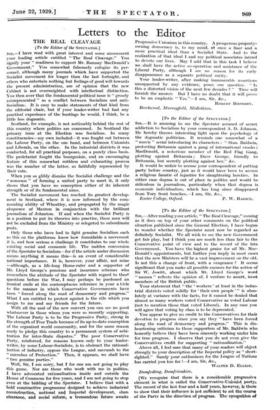Letters to the Editor
THE REAL CLEAVAGE [To the Editor of the SPECTATOR.] SIR ,—I have read with great interest and some amusement your lending article entitled " The Real Cleavage." You signify your " readiness to support Mr. Ramsay MacDonald's Government." You somewhat fulsomely eulogize its per- sonnel, although many journals which have supported the Socialist movement for longer than the last fortnight, and others who entertain nothing but feelings of good will towards the present administration, are of opinion that the new Cabinet is not overweighted with intellectual distinction. You then aver that the fundamental political issue is " grossly misrepresented " as a conflict between Socialism and anti- Socialism. It is easy to make statements of that kind from the editorial chair, but if your leader-writer had had any practical experience of the hustings he would, I think, be a little less dogmatic.
Scotland, for example, is not noticeably behind the rest of this country where politics are concerned. In Scotland the primary issue at the Election was Socialism. In many constituencies—my own included—it was fought out between the Labour Party, on the one hand, and between Unionists and Liberals, on the other. In the industrial districts it was conducted, for all practical purposes, on a purely class basis. The proletariat fought the bourgeoisie, and an encouraging feature of this somewhat ruthless and exhausting process was the number of the latter, as faithfully represented by their vote.
When you so glibly dismiss the Socialist challenge and the 0 nonsense" of forming a united party to meet it, it only shows that you have no conception either of its inherent strength or of its fundamental aims.
The Socialist movement has reached its greatest develop- ment in Scotland, where it is now informed by the com- manding ability of Wheatley, and propagated by the magic eloquence of Maxton in conjunction with the brilliant journalism of Johnston. If and when the Socialist Party is in a position to put its theories into practice, these men will not be excluded from the Ministry or relegated to subordinate posts.
Only those who have had to fight genuine Socialism such
as this on the platforms know how formidable a movement it is, and how serious a challenge it constitutes to our whole existing social and economic life. The sudden conversion of the Spectator to Socialism—for if the article under discussion means anything it means this—is an event of considerable national importance. It is, however, your affair, not mine —although, as a life-long Home-ruler and a supporter of Mr. Lloyd George's pensions and insurance schemes who remembers the attitude of the Spectator with regard to these questions before the War, I may perhaps be pardoned an ironical smile at the contemptuous reference in your a ticle to the manner in which Conservative Governments have been " forced along the road of democracy and progress." What I am entitled to protest against is the role which you assign to me and my friends for the future.
With all the zeal of the new convert you can see no good whatsoever in those whom you were so recently supporting. The Labour Party is to be the Progressive Party, strong in the strength of Free Trade because of its up-to-date conception of the organized world community, and for the same reason ready to pledge this country to a permanent system of arbi- tration for inter-State disputes." The poor Conservative Party, reinforced, for reasons known only to your leader- writer, by some Labour-Socialists, is to obstruct the rational- ization of industry, oppose the League, and succumb to the " microbes of Protection." Then, it appears, we shall have " two genuine parties."
Well, Sir, I am sorry, but I for one am not going to play this game. Nor are those who work with me in politics. I have advocated rationalization inside and outside the House of Commons for five years, and I am not going to stop even at the bidding of the Spectator. I believe that with a bold constructive programme designed to achieve industrial reconstruction t national and Imperial development, slum clearance, and social reform, a tremendous future awaits
Progressive Unionism in this country. A prosperous property- owning democracy is, to my mind, at once a finer and a more practical ideal than a Socialist State. And to the realization of that ideal I and my political associates intend to devote our lives. May I add that in this task I believe we shall have the active co-operation and assistance of the Liberal Party, although I see no reason for its early disappearance as a separate political entity. Your leader-writer, after making innumerable assertions unsupported by any evidence, poses one question. " Is this a distorted vision of the next few decades ? " Time will furnish the answer. But I have no doubt that it will prove to be an emphatic " Yes."—I am, Sir, &c., Beechwood, Murrayfield, Midlothian. ROBERT BOOTHRY.












































 Previous page
Previous page